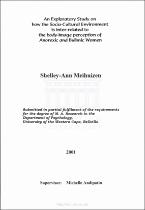An exploratory study on how the socio-cultural environment is inter-related to the body -image perception of anorexic and bulimic women
Abstract
The study is a qualitative exploration on how women who suffer from anorexia nervosa and bulimia nervosa feel their socio-cultural environment has influenced their body-size and body-shape perception. The study is motivated by the urgency to challenge our current understanding of the causes of eating disorders which have for many years, been restricted to the domain of the personal, intra-psychic and
familial factors. Given the high incidence of both disorders, it no longer seems appropriate to conceptualise the causes of these disorders as a solely private issue. feminist and socio-cultural critiques and empirical studies have highlighted the important role that the socio-cultural environment plays in the development and/or maintenance of anorexia and bulimia.
The study is embedded in feminist and socio-cultural paradigms and employs a qualitative methodology. The central aim of the study is to explore how the sociocultural environment, with a focus on women suffering from anorexia nervosa and bulimia nervosa, is inter{elated to their body-image perception. Two different methods will be used: in-depth interviews and focus groups, as well as a demographic questionnaire. The two above-mentioned methods will produce textual data which will be analysed, from which the dominant themes that emerge will be drawn out. It is hoped that this research project will help form the basis for a more comprehensive study in the near future, which could further could further contribute to a better understanding of the particular connotations of the words'fat' and 'thin"
and what they imply for South African women.

